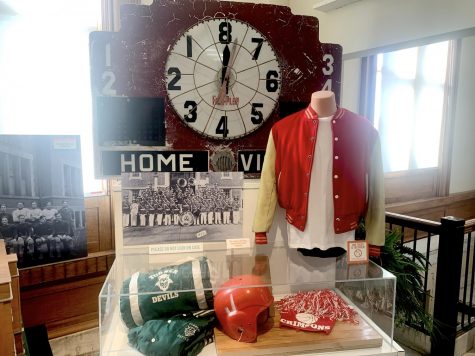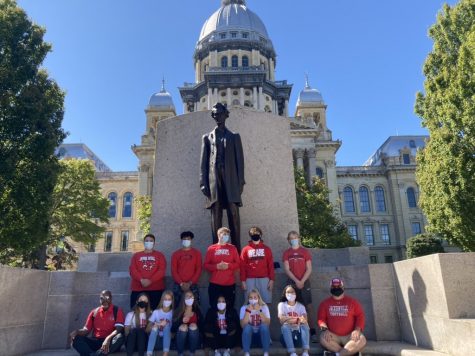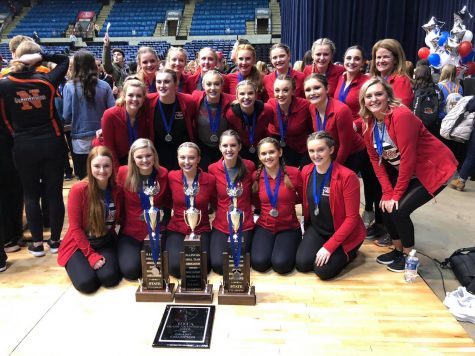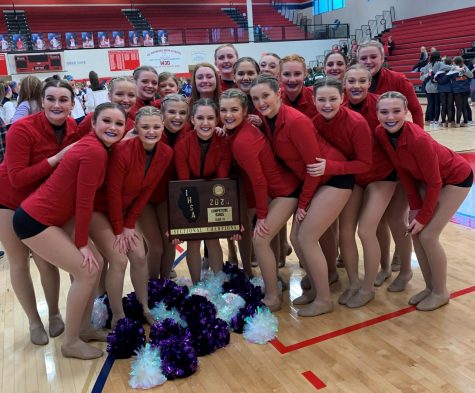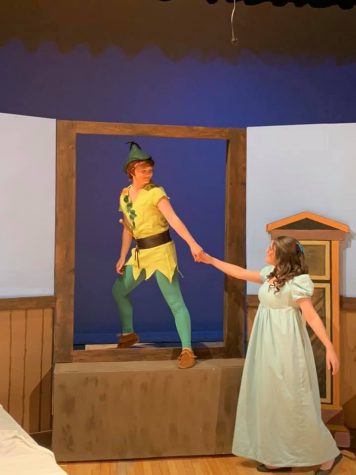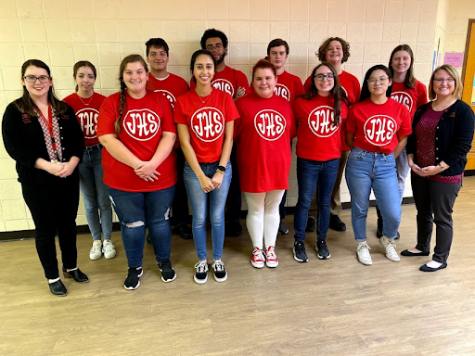The Gates That Separate Us
January 31, 2017
Kameron Chappel, a JHS junior and Crimson J staff member, submitted the following fiction story for the Regional Writing Contest.
I do not talk much now, not since that day, not since her. Life is funny in that way, how one person, one event, can forever dilute your prior sensibilities and pour the mold of sternness around your heart. I was 19 years old when he came to power. I was young, fresh out of the university, and in debt. This depression hit us all hard. When he promised to rebuild the nation, we listened. He sold us naïve adolescent’s false hopes for our father’s failures in the Great War. When he placed the blame not on our fathers but on the Jews, we relished on the thought of redemption. By the thousands we joined his ranks, and with hatred fueling us, we sought to destroy our cancerous untouchables. With no second thought, we delved into the extermination business. This was the beginning of the end for us.
By request I was assigned to be a guard at a camp in Poland. Hundreds of young, eager “true Germans” traveled to these camps, and we expected to be guarding monsters gnashing their teeth and spitting hatred, but when we arrived, the scene was very different. Men, women, and children–lifeless, wandering, staring hopelessly forward with fear in their eyes. I was a rifleman in the execution squad and our job was to take care of those who broke the rules. Daily we would kill dozens; they seemed to be relieved to be there and to be released of the burden of the next days ahead which would ultimately lead to their demise in either case. Bags were placed upon their heads so that we would not know whom we were shooting and to show the Jews that they would be punished for their “cataclysmic actions in the fall of Germany,” dying a death of anonymity. At first I continued to think of them as vermin, but with every trigger I pulled, I began to see things differently. I began to question why I was there in the first place and what amount of fallacy I had fallen victim to. I did this same gut-wrenching routine for over a year, and then on a warm spring day, I was called to help greet a train full of new attendants and that was when I saw her.
It took my eyes a moment to adjust to the sun glaring in my face, but when the blindness was lifted, I saw her there. She was the single most flawless thing I had ever looked upon. Long fiery red hair, silken skin, and eyes that seemed to glow like embers. Just as I had time to recognize what I was seeing, the Jews were screamed at to get moving and with terrified expressions they were herded like cattle to their quarters where even the poorest of men would refuse to lay their heads. I knew I had to get closer to her. It was a few days before I saw her again. Every day I would watch her. Each day she seemed to become more and more deteriorated. The red started to fade and her skin was losing its luster. I had to do something. I approached her and with a false sternness I asked for her name. She whispered nervously, “Adaline.” I moved closer and she winced; in a soft tone I said, “I am Lucca.” I then asked her if she had eaten. She slowly nodded, but I knew she was lying. I told her to follow me and took her to the bread room. I gave her a loaf and told her to hide it. She thanked me and moved out of the room. She was still very cautious and barely uttered a word more before disappearing into the crowd of corpse-like prisoners. Every day I sought her out, and she slowly became comfortable with me. After months it moved to more than just a bread exchange; we snuck away nightly. “What would they do if they found out?” she asked, very concerned. I had to think about it and then I just had to shake my head. She understood what I was trying to say. I risked my life and reputation, but I did it for her. I loved her from the first time I saw her.
I still had to carry out my executioner duties. At this point I just closed my eyes when I had to do it. I had considered purposely missing but that would be too obvious and would expose my true allegiances. I brought bread to Adaline one specific night. She was now looking more healthy than all the other prisoners. She was crying when I came to her. She told me of her parents’ death and how she hated the German government. She explained that she could not stand to be here another day. I had seen too much at this point. We decided we would leave the next night. It would be a daring feat but we were determined. I reached into my shirt pocket and pulled out a ring my grandmother had given me before I left. I slipped it on her finger and gave her my promise. I had turned to leave but she grabbed my shoulder. When I turned she had a tear running down her face. She kissed me and whispered something in Hebrew that I could not understand. “Ani ohev otach” was what she said. I had to make it through the next day and make my escape with Adaline the next night. I was scared, but I was so overwhelmed with love that I didn’t much care.
I looked for Adaline all morning but could not find her. I figured she was off in the fields doing her daily jobs. I was very tense and ready to escape this damn war and this god forsaken camp. I was called over the speaker to the center of the camp to do my daily job. I prayed for forgiveness on my way there. The captain explained that these people had been caught with stolen items. He lined us up across from the poor souls with bags on their heads. “Ready.” I was sweating and wondering whose husband or wife I was taking away. “Aim.” I closed my eyes. “Fire.” I squeezed off and I looked up, from the bag fell long red hair.
“It can’t be her,” I thought. I just saw her last night. I started for the body when my officer asked what I was doing. I ignored him. He yelled at me to stand back, but I kept moving forward, tears now streaming down my face like a young child. Never in my entire life had I wished that I killed a stranger. Now I prayed that when I pulled back that veil it would be an unknown. I approached the lifeless body, and on the body’s hand I saw the ring.. It was her. She was gone. The love of my life was gone and it was my fault. This war, this prison, the unfulfilled aspirations of the Fuhrer–all to this, nothing. I broke into sobs and my officer approached me. I turned and swung my rifle at him. The last thing I remember was a rifle hitting me in the back of the head.
I spent the rest of the war as those I was sent to guard, a prisoner of physical and mental confinement; everyday I begged to be united with her.
I am old now. There was never another Adaline. I looked up what Adaline had said to me the night before her death. It meant “I love you.” Life is funny in that way, to just begin to get the sweet taste of happiness amongst evil only to have it taken away not by some stranger but by your own hands. The war ended for most, but for me it had just started. To this day I fight that war. Daily I’m reminded of the lives I took and the light that I unknowingly extinguished within my own life. War is hell, but the absence of the one you love is far worse.

